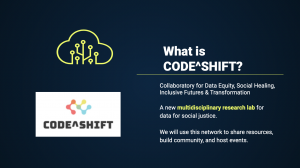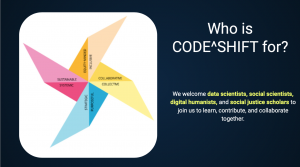Introducing Code^Shift, a data science collaboratory for social justice initiative
By Allison Brock
Gender and racial discrimination, health disparities, education and literacy inequality, LGBTQ+ rights and more are rife with human bias. In today’s digital landscape, these minority groups now face the additional threat of computer-based bias.
Texas A&M University faculty and researchers have created the Code^Shift initiative, a research lab using data science for social justice to combat bias.
Code^Shift stands for “Collaboratory for Data Equity, Social Healing, Inclusive Futures and Transformation,” said Srividya Ramasubramanian, a Presidential Impact Fellow and Professor of Communication. “It is a multidisciplinary research lab connecting data science and social justice. This initiative is developing a full proposal to the Texas A&M Institute of Data Science Thematic Data Science Labs Program.”
Ramasubramanian is director of the initiative and hosted the May 10 launch event.
“I am pleased with the tremendous response to the launch event, with over 85 researchers from across six colleges,” said Ramsubramanian. “It is crucial to incorporate diversity literacies among data scientists, just as it is important to consider the role of data within social justice initiatives.”
Certain groups are often faced with digital biases, whether it be in health care diagnosis or treatment or AI-based hiring software, said Lu Tang, Ph.D and Code^Shift co-director. Facial recognition software is often more accurate in reading white faces because the training data discriminates against “non-white” races, explained Tang, an associate professor in the Department of Communication.
“We live in this world where a lot of parts of our lives are controlled by computer algorithms,” said Tang. “Computers are very sensitive, and they pick up biases that we have in human society in how we communicate, and it translates into biases in computer programs.”
Code^Shift co-directors also include Theodora Chaspari, Ph.D., and Ruihong Huang, Ph.D., from the Department of Computer Science and Engineering who together bring a special element to the table when approaching biased data in data science.

Code^Shift, a collaboratory initiative for data equity, social healing, inclusive futures and transformation, incorporates multidisciplinary studies to promote social justice.
“We’ve gathered a group of researchers from humanities studies, like the College of Liberal Arts, women’s studies, digital humanities, human rights and social justice,” said Tang. “But also, colleagues from the computer science department, who are primarily working in subjects like natural language processing that teach computers how to read.
“We’ve got these two groups of people who otherwise wouldn’t talk to each other and we look at these kind of studies, gender ratios and other kinds of biases that are in natural language processing or artificial intelligence,” explained Tang.
By combining efforts with computer scientists, Tang said Code^Shift will provide solutions to computer bias and inequality to accelerate social justice.
“The goal is to understand the existence of these kinds of biases and also come up with solutions using computational modeling and a computer science perspective to come up with a better algorithm that has less of a bias,” said Tang. “We think of computers as objective, scientific and mathematical. But human bias can be found in computer models that influence people’s lives.”
There are often strict lines between academic coding and communication disciplines, said Riley Farrell, research assistant to Ramasubramanian and a senior communication major at Texas A&M.
“Code^Shift is filling this need that society has for a multidisciplinary collaborative opportunity for social scientists, digital experts and data scientists to contribute to the cause of social justice,” said Farrell.
Upcoming Code^Shift events and how to get involved

Code^Shift encourages professionals from various disciplines to take part in combatting digital biases against minority groups.
Code^Shift will hold a Discover-Text Workshop to discuss tech software on May 24. Chaspari and Tang will lead a health equity panel on June 7. Code^Shift will also host “Watch & Talk: Coded Bias” on June 21 when participants will watch a documentary on coded biases followed by discussion.
“We’ll watch the movie and then join together and reflect on what we’ve learned and what we can do with what we’ve watched,” said Farrell.
Potential participants can stay up to date by filing out this Google Form to receive news updates and event information.
Code^Shift can be found @codeshifttamu on Facebook, Twitter and Instagram.
Ramasubramanian’s book “Quantitative Research Methods in Communication: The Power of Numbers for Social Justice” is scheduled for release Friday, May 14.

